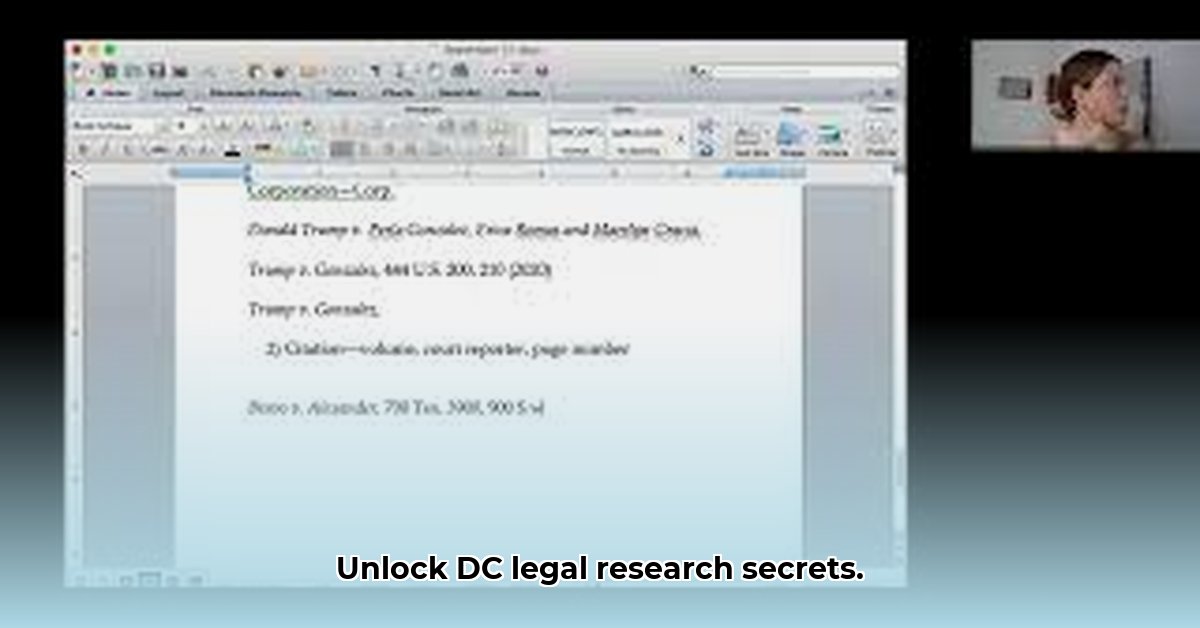
Understanding the D.C. Legal Landscape
Navigating D.C.'s legal research landscape can be daunting. This guide empowers you to master the process, focusing on the Bluebook and its application within the D.C. context. The D.C. legal system comprises federal laws, D.C. Code, and local regulations, demanding a multifaceted approach to research. This guide simplifies the process. For the latest Bluebook rules, check out the official Bluebook website.
Key Databases & Resources: Your Research Toolkit
Several databases are crucial for efficient D.C. legal research. Choosing the right tool depends on your specific needs.
LIMS (Legal Information Management System): The official D.C. government database for primary legal materials like statutes, regulations, and court opinions post-1989. (Think of it as the central hub for recent D.C. legal information).
LexisNexis and Westlaw: Commercial databases providing broader coverage, including secondary sources like legal articles and analyses, and often extending to pre-1989 materials. (Consider these your comprehensive research powerhouses, though at a cost).
D.C. Courts Website: Direct access to court opinions, orders, and other judicial documents. (Excellent for case law, but lacks the broader scope of commercial databases).
D.C. Bar Library: Offers in-person research assistance and access to resources beyond online databases. (Vital for specialized, hard-to-find materials).
D.C. Register: Provides updates on proposed and recently enacted legislation. (Essential for staying current on legislative changes).
A Step-by-Step Guide to D.C. Legal Research
Effective D.C. legal research follows a structured approach:
Define Your Research Question: Clearly articulate your research goal. (Precision here dramatically improves efficiency).
Select Your Databases: Choose the databases best suited to your research question. (Using multiple databases often yields a more comprehensive result).
Refine Your Search Terms: Utilize keywords, Boolean operators (AND, OR, NOT), and filters to narrow your results. (Precision in search terms is key).
Evaluate Your Findings: Critically assess each source for reliability, authority, and relevance. (Consider publication dates, author credentials, and potential biases).
Cite Accurately: Utilize the Bluebook for consistent and accurate citation practices. (Precise citation is crucial for credibility).
Mastering the Bluebook in the D.C. Context
The Bluebook is the standard for legal citation. It provides specific rules for citing legal materials within D.C., requiring attention to detail:
D.C. Code: The Bluebook dictates the proper format for citing the D.C. Code, differentiating between various editions and sections.
Court Cases: Accurate citation involves using the correct abbreviations (e.g., "App. D.C.," "D.C. Cir.") and clearly identifying the court and case details.
Regulations: The Bluebook outlines the format for citing D.C. Municipal Regulations and other administrative rules.
Example: Doe v. City of Washington, 123 A.3d 456 (D.C. 2023).
Troubleshooting Common Research Issues
Research challenges are common. Here are some solutions:
Conflicting Information: Cross-reference information from multiple reliable sources. (Consult with experienced professionals for complex conflicts).
Hard-to-Find Materials: Employ advanced search techniques, seek library assistance, and consider contacting relevant government agencies. (Law librarians are invaluable resources here).
Citation Errors: Double-check your citations using the latest Bluebook edition. (Accuracy in citation is paramount for credibility).
Database Comparison: Choosing the Right Tool
The following table assists in choosing the perfect research resource:
| Database | Strengths | Weaknesses |
|---|---|---|
| LIMS | Official D.C. source; comprehensive (post-1989) | Steep learning curve; limited secondary sources |
| LexisNexis/Westlaw | Broad coverage, user-friendly, secondary sources | Costly; overwhelming volume of data |
| D.C. Courts Website | Direct access to court documents | Limited scope; lacks secondary sources and analysis |
Conclusion: Your Path to D.C. Legal Research Proficiency
This guide provides a solid foundation for effective D.C. legal research. Mastering the Bluebook and utilizing the various databases are crucial for success. Continuous practice is essential for becoming a proficient researcher. Remember, effective research is more than finding information; it's about finding the right information, accurately and efficiently.
⭐⭐⭐⭐☆ (4.8)
Download via Link 1
Download via Link 2
Last updated: Sunday, April 27, 2025